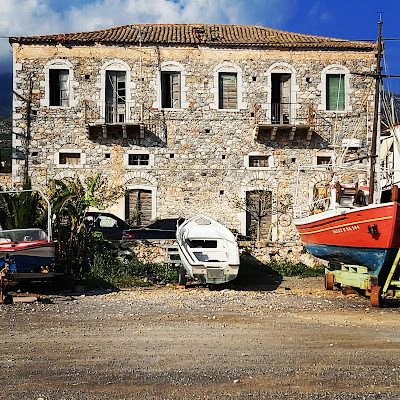 |
| The olive grove keeps us busy |
Our decision to stay was made just as Greek authorities were shutting down air traffic and mainland borders. In falling domino fashion, the entire country pretty much came to a standstill within a couple of weeks of our deciding to stay. For many of those weeks we've been allowed out to only six destinations. The government had to be told each time we left our home. A hashtag 'Menoumespiti' became a rallying cry across social media here -- stay home!
On Greek Easter weekend the travel restrictions were enhanced from Saturday evening until midnight Monday night. Traffic was severely limited. Fines for violators were 300 euros for the driver, 150 for each passenger and your license plates were taken. Pretty smart move, as you can't drive without plates here and to get them back, you had to pay the fines! (One exception made in the village was to allow folks like us to pick up 'to go' Easter dinners that had been ordered before the shutdown was announced.)
 |
| A village scene from the parking lot |
Tomorrow, Monday, May 4th the country begins reopening. We will no longer be required to notify the government of our movements. Small businesses, including hair dresser and barbers, will begin operating within strict social distancing guidelines. We will be required to wear facemasks in stores and other public areas for an unspecified amount of time or face a potential 150 euro fine. Numbers of COVID19 cases will be monitored on a 24-hour basis and if there is a spike, restrictions will be re-imposed. If numbers hold at acceptable levels, the country will continue to reopen in a gradual process that takes us to July.
The future of travel to and from Greece is still somewhat up in the air. There is talk of allowing only those from certain countries into the country; those with low COVID19 numbers. And there is uncertainty about how and when the European Union will reopen its borders.
For us, the pandemic has put the brakes on our spring travels and has slowed our desire to plan future travels. Neither of us are eager to put ourselves in an airplane or airport right now.
 |
| Traveling within Greece was a treat last year |
Our longtime readers will likely remember that a year ago that I was whining about not being allowed to leave Greece while our residency permits were being renewed. I described us as being held 'hostage' although we could travel to our heart's content anywhere we wanted to go within the country.
This year going to the grocery store or pharmacy feels like taking a major trip. What a difference a year makes! Instead of grumbling about the limits on movement, we are singing the praises of those who imposed them. We are seeing travel -- and life, to a certain extent -- differently these days.
The Village Parking Lot - A Destination
'Let's have a coffee in the parking lot,' I suggested after a recent grocery store trip. It is the village parking lot, the one in which we sometimes sip a glass of wine from a plastic glass while waiting for a 'to go' meal to be prepared.
 |
| Going out for wine - quite literally! |
Now there is really nothing special about our municipal parking lot. It is a relatively non-descript, barren stretch of land bordering the Messinian Bay. Two tavernas serve drinks on portable decks in tourist season. It is the gateway to the harbor's boat launch.
 |
| The village parking lot and taverna deck in a pandemic |
Back in normal tourist seasons it was difficult to find a parking space there. Sometimes even entering and exiting required holding your breath as you squeezed past double parked cars. We usually tried to avoid it until it emptied in the fall. Sometimes the most action in the lot during the winter is when winter storms create such fierce wave action that stones are tossed over the sea wall. A bulldozer is brought in to clear them so that cars can navigate the lot's unpaved surface.
 |
| Social distancing is a snap in this parking lot |
| Friends from the States - drinks before dinner |
| Dinner in the parking lot |
Until our coming and going was curtailed by the government, and social distancing the norm, I hadn't really appreciated that big old lot. I sincerely hope that when this ends, I will remember those trips to the parking lot as having been a special part of this pandemic lockdown.
Perhaps Columbian writer Gabriele Garcia Marquez said it best when he wrote,
 |
| May we always remember our trips to the parking lot |
Our thanks for being with us today - as always we appreciate the time you spend here. We hope you continue to cope with the coronavirus safeguards within which you live and that you, your family and friends stay well.
Linking this week with:
Mosaic Monday
Through My Lens
Travel Tuesday
Our World Tuesday
My Corner of the World Wednesday
Wordless Wednesday






